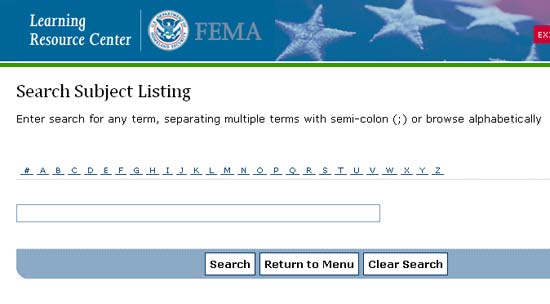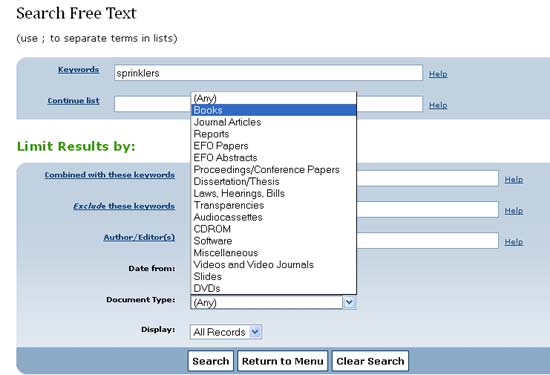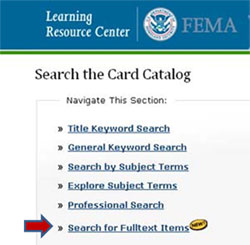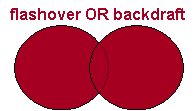The Research Process
Step 1: Clearly Define Your Topic or "Information Need"
Start with a broad area of interest.
Example: Community risk reduction efforts.
Narrow down your topic.
Example: Residential fire alarms.
Focus on something specific.
Example: The efficacy of a department standard operating procedure (SOP) for the automatic residential fire alarm activation response.
Write a “working” Thesis.
Example: An SOP for the automatic residential fire alarm activation response that has an established purpose, scope, and clearly defined procedures can have a very positive impact on community risk reduction efforts.
Note that this does not have to be your final thesis, just an idea to get the research process going. You can change and
modify your thesis along the way.
Other Things to Consider:
How much do you know about the topic?
Is the topic manageable? Too much information - narrow your topic. Not enough information - expand your topic.
Time needed - If your topic is too time-consuming: choose another topic or narrow your current topic.
Availability of Information - are all the sources easily accessible
(all on-hand, interlibrary loan time limits, etc.)
Back To Top
Step 2:
Collect / Find Information
How much information will you need? That will depend on the reason you need the information. If you are writing a paper, what size does your
paper need to be?
What kind of information do you need?
What level of information do you need? Scholarly information, popular information,
both?
How current does the information need to be?
Plan your search strategy. Learn the subject terminology and the keywords associated with your topic. A good way to learn the appropriate subject terms for your search in the LRC online catalog is to browse our list of subject headings by selecting the Explore Subject Terms link.

Identify Information Sources -what type of sources will you use for your
topic?
Reference Tools: there are a wide variety of reference tools found in both print and online formats.
Often, you'll find some ideally suited for your topic. Reference materials point you to other sources of information.
Encyclopedias, handbooks, codes and guidebooks are among the many resources that fall into this category. Adobe Acrobat PDF Help
Check out this Guide to Essential Reference Titles for the Fire Service
Books: try searching the
LRC Catalog. Go to the General Keyword search link, enter your term(s) and choose Books from the Document Types drop-down menu.

You can also try browsing our stacks. You'll find our fire science related books organized in general terms as follows:
Building Safety, Design, Construction: TH1-TH9000
Electrical: TK9-TK1078
Emergency Medicine, EMT, Paramedics: RC86-RC87
Fire Chemistry: TP265
Fire Codes: KF3975-KF3976
Fire Combustion, Ignition: QD500-QD516
Fire Extinguishing Agents: TP266
Fire Service Hydraulics: TC160-TC163
Fire Fighters, Protection, Prevention, Tactics: TH9100-TH9598
HAZMAT Codes and Regulations: KF3945-KF3964
Risk Analysis: T174-T175
Wildland Firefighting: SD420-SD421
Periodical Literature: Journals, newsletters, and magazines are all valuable sources of information. The LRC's catalog is a unique guide to this periodical literature with citations on fire, emergency response, natural disaster, and homeland security topics going back to the early 1970s. LRC staff index nearly 5,000 newly published articles each year, from scores of professional journals, magazines and newsletters across the country and internationally. Try using the LRC catalog and limit your search this time to Journal Articles. Any citations you find will be available at the NETC library. Alternatively you can take any citations you find to your nearest public library and they can help you obtain the materials either thru their own print or electronic holdings or via interlibrary loan.
Reports, dissertations, proceedings: can be
found in a wide variety of formats, including print and electronic. Our Search Fulltext Items
Page is a great place to begin searching for government documents and reports from think tanks and professional organizations of all kinds as well as papers already published by students in the Executive Fire Officer program. Searching from this page will return just items that are freely available to download or read online.

You may also want to go back to the General Keyword Search page and limit your results by type for reports, dissertations, proceedings and other materials not available in fulltext.
The Internet: You can find some great information on the Internet, but you must always carefully evaluate the web pages you find. Educational sites (.edu), US Government sites (.gov) are often reliable sources for information. Search
engines like Google's Government Search or the LRC's Google Custom Search Engine
focus specifically on these sites.
Back To Top
Step # 3: Evaluate Your Information
The following are the 5 evaluation criteria used in evaluating sources.
Authority: who is responsible for the work, and what are their
credentials
Reliability: does the information seem accurate?
Currency: is the information up-to-date?
Completeness: is the information complete or is it just a summary
of another work? Information Level? Intended Audience?
Relevancy: does the information source answer your
questions?
Back To Top
Step # 4: Use and/or Do Something With the Information
Write the paper or give the presentation. Organize your Information - using an outline is always a good idea.
Back To Top
Step # 5: Use the Information Ethically and Legally -- Cite Your Sources
Citation: reference to an exact Information Source. Where
the author got his/her info.Cite your sources:
To back up your research with facts.
To allow others to follow your research.
To give credit to the original author(s).
To avoid Plagiarism.
Plagiarism is: the unacknowledged inclusion, in work submitted for credit, of someone else’s
words, ideas, or data. The failure to identify any source, published or unpublished, copyrighted or uncopyrighted from which
information, terms, phrases, or concepts have been taken, constitutes plagiarism.
Citations contain the following minimum
information:
Title of the information source / work.
Author.
Publishing Information.
Web Address (if applicable).
Sample book citation for a reference list in APA format:
Taylor, M. A. (2008). Jumping fire: A smokejumper's memoir of fighting wildfire. New York, NY: Harcourt, Inc.
Sample journal article citation for a reference list in APA format:
Castagna, J. (2008). Wildfire maps aid FEMA mission. Fire Engineering, 161(5), 123.
Back To Top
Style Guides
Style Guides - show you how to properly cite your
Information Sources. There are 4 main style guides; APA, MLA, Chicago and Turabian.
APA (American Psychological Association). Publication manual
of the American Psychological Association.
Call Number: BF 76.7 .P976 2001
MLA (Modern Language Association). MLA handbook for writers
of research papers.
Search for Holdings in Library Near You
Chicago Manual of Style. The Chicago manual of style.
Search for Holdings in Library Near You
Turabian. A manual for writers of term papers, theses, and dissertations.
Call Number: LB 2369 .T8 1996
Style Guides Available Online: http://library.concordia.ca/help/howto/citations.html ;
http://www.lib.lsu.edu/ref/style.html ;
http://www.lib.duke.edu/libguide/cite/works_cited.htm ;
http://library.osu.edu/sites/guides/turabiangd.html
Searching
LRC Online Catalog Searching
Boolean Search Techniques
Enter your keywords or phrases representing synonyms or related terms for a topic of interest. Try to use a variety of keywords since additional items on your topic may use different terms.

- Expand your results set (Boolean OR): If entering a list of terms, separate each with a semicolon. The semicolon in the LRC database serves as the Boolean OR operator. This broadens your search by returning all item records that contain any one or more of the terms you list.
*For example, entering: flashover ; backdraft - yields over 340 records where either one or both terms are present.

- Narrow your results set (Boolean AND): When you join terms with the Boolean AND operator in a search, it narrows your results to only records containing all of your search terms. Absent a semicolon between your keyword(s)the LRC system automatically applies the Boolean AND operator.
*For example, entering: flashover backdraft - returns about thirty records where both terms are present in each record.
- Refine your results further: Use quotation marks in order to find records containing an exact phrase.
*For example, maybe you want to know what items relate specifically to smoke explosion types of backdrafts. Entering: "smoke explosion" - returns more than a half dozen hits where this exact phrase appears.
Back To Top
Searching the World Wide Web
The staff at the NETC Learning Resource Center created a Google custom search engine to help you to more easily find good information on topics of interest from the growing number of fire and emergency services websites.
What's a Custom Search Engine? Google lets you build a CSE by selecting which sites/URLs are searched, and by defining a set of rules that guide the ranking of results. We can select in other words exactly which fire service websites Google searches. This means that your search results are likely to be more relevant, more focused, more trustworthy. Click here to start your search
EFO Papers
The Executive Fire Officer research papers are written by individual students after they leave campus as part of their class assignment. These research papers are available for in-house use by library visitors, for checkout by NETC users and for loan to off-campus users via interlibrary loan.
Please note however that the LRC since 1996 only retains EFO papers that received a grade of 3.0 or better. All other papers are entered into the LRC catalog only with an abstract. If you'd like to get a copy of a paper for which the LRC has only retained an abstract you'll need to contact the author directly.
Most EFO Papers published since FY98 are now available to download or read online in their entirety. You'll see links in our online catalog citations to these papers as they are available in digits. There is a backlog in scanning current year papers so the most recent titles may still be unavailable online.
Click here to view Online Tutorial on how to find EFO Papers in our catalog. (Duration: 2 minutes)
* Note: To view the tutorial, you may need to allow pop-ups for this site.
Content for "The Research Process" is partially derived from the CARL
Online Tutorials Page at http://carl.army.miland the LSU Tutorial page "The Research Process", available at
http://www.lib.lsu.edu/instruction/research/research-process00.html.
|

